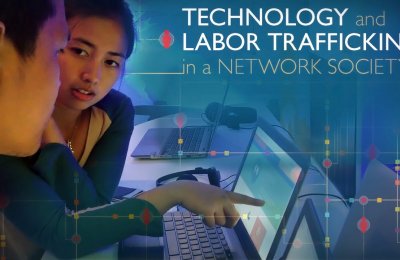By Jeremy Rosenberg
Leading media and entertainment technologists, content creators and digital-era researchers and strategists from industry and academia came together last Thursday for the USC Annenberg Innovation Lab's 2013 Innovation Summit.
This third annual, invitation-only gathering – see here and here for articles about each of the first two Summits – was centered this year on a scenario planning exercise.
"This was a big experiment on our part," Jonathan Taplin said. "We didn't know if it would work. My sense is that it did."
Taplin is the Innovation Lab's director and an USC Annenberg clinical professor. The Innovation Lab brings together experts in a wide range of disciplines from academia, for-profits and other non-profits.
The Lab carries a mission "to be a leading innovator and advisor on transformational changes happening in our participatory culture," according to the 'About' text on the Lab's website.
Scenario planning is a more creative forecasting cousin to the longer-standing discipline of strategic planning. Scenario planning involves using research, acumen, teamwork and narratives in order to prepare and share four different but plausible stories about the possible future.
The Innovation Summit's scenarios revolved around two media and entertainment business models: the continuing profitable growth of online tracking of internet users; and the continued profitable bundling of channels sold to consumers by cable networks and satellite providers.
"What if these two conventional models, reflecting both new and old common industry wisdoms, were fundamentally overturned by disruptive forces in the next few years?" read text in the Summit briefing book distributed to attendees.
The Summit's four scenarios were named: "Status Quo Plus," "Privacy Power," "Searchland," and for the most radical of the quartet, "DIY World."
In the latter scenario, bundles are anti-trust sued or otherwise forced out of existence. Meanwhile, privacy advocates or other forces succeed in strictly regulating and limiting access to personal data. By way of comparison, in the "Status Quo Plus" scenario, during the seven-year-period (2013-2020) the exercise posits, there would be little change in either unbundling or privacy efforts.
Innovation Summit participants were assigned upon arrival to one of the four scenario teams. They joined colleagues seated at clusters of circular tables in the USC Davidson Conference Center, where the Summit took place. To walk around the room during the scenario planning exercise was to hear one participant say, "competency and comfort leads to low-risk innovation," and another say success can be an 800-pound gorilla.
Among so much more overheard among the four scenario teams: "Technology evolves faster than laws," and "Who really bares the burden of all this? Is it the government? Is it the taxpayer? Does the employer have to?" Further Summit discourse pinged from Syria to PBS to North Korea to Google to Kickstarter to Snakes on a Plane to Amanda Palmer to the SEC and IPOs to Downton Abbey.
The Summit was an all-day affair. The scenario planning session occurred in the afternoon, following lunch and presentations by a trio of student groups vying for the $5,000 Crunch Student Innovation Contest prize. (Susannah Luthi, Kai Chan and Niree Noel won for "Connu," their interactive, short fiction publishing app.)
In preparation for the afternoon scenario planning, morning at the Summit featured a pair of all-star packed panels – or, "Provocation Panels" to use Innovation Lab nomenclature.
The first panel was titled, "Transmedia and the Future of TV." Panelists included: USC Annenberg professors Henry Jenkins and Gabriel Kahn; Howard T. Stein, the Facebook Inc. strategist for entertainment; Hardie Tankersley, vice president of platforms and innovation for Fox Broadcasting; and Aaron DeBevoise, Machinima's executive vice president, network programming.
The latter duo, seated onstage next to one another, engaged in some of the day's liveliest discourse – sometimes clearly finding common ground, other times, not. Tankersley's Fox is, or at least has been, a more traditional television network; DeBevoise's Machinima has received the second-most views of any channel in YouTube history.
Together, the panel spent their hour discussing everything from subscription models for content, to the nature of the way people watch television, to the future of TV news, to social media's effectiveness at exciting users to become viewers as they engage and share related content.
The Innovation Summit's second panel was titled, "Big Data and Privacy." The five on-stage participants here were: USC Annenberg professor François Bar; Jack Lerner, the director of the USC Intellectual Property and Technology Law Clinic; Aleecia M. McDonald, director of privacy at the Stanford Center for Internet and Society; Frédéric Josué, who holds head of innovation and chief of staff titles at Havas Media; and Peter Marx, Qualcomm's vice president of business development.
USC Annenberg's Bar began the session by mentioning the privacy paradox. As in: People say privacy is important to them, but then those same people promptly give up their privacy. Stanford's McDonald noted an online impulse: "'But I want to see the dancing pigs!' This is how humans are. Click." Then she said, "There are many reasons why humans are bad at making this tradeoff for privacy."
The panel discussed different conceptual and legal ideas globally regarding privacy. Josué and Bar pointed out that there is no word in French for privacy, and that the English word is used instead. Josué's employer, Havas, is a USC Annenberg Innovation Lab sponsor – for the list of other for-profit as well as non-profit sponsors, visit this page.









